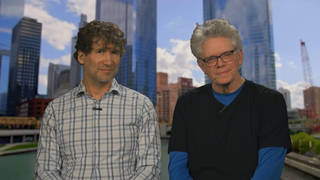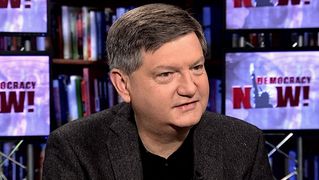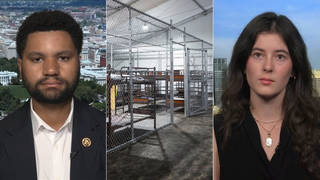
Guests
- Matt ApuzzoNew York Times reporter. He was in the courtroom Monday when James Risen testified and wrote about it in an article headlined “Defiant on Witness Stand, Times Reporter Says Little.”
In a closely watched press freedom case, New York Times investigative reporter James Risen was called to the witness stand Monday after a seven-year legal battle against the government’s attempts to subpoena him and force him to reveal his source. The hearing in Virginia took place ahead of the trial of former CIA officer Jeffrey Sterling, who is accused of giving Risen classified information which revealed a botched CIA plot to disrupt Iran’s nuclear program. It is unclear yet if Risen will be called to testify at Sterling’s trial. Without more information from Risen, Sterling’s defense attorney argues the case should be dismissed. We are joined by Matt Apuzzo, a colleague of Risen’s at The New York Times who is covering the case. During his previous stint with the Associated Press, Apuzzo and Adam Goldman won a Pulitzer Prize for their coverage of the NYPD’s Muslim surveillance program. The Department of Justice opened three separate investigations into leaks related to their reports.
Transcript
AMY GOODMAN: This is Democracy Now!, democracynow.org, The War and Peace Report. I’m Amy Goodman. Our top story, 12 dead in the offices of a French satirical magazine. They were shot dead. They had recently published cartoons of the Prophet Muhammad. In our next segment, we’re going to talk about a Ferguson grand juror who would like to speak out, but right now, Juan?
JUAN GONZÁLEZ: Well, we turn to a freedom of the press case Democracy Now! has followed closely. New York Times investigative reporter James Risen was called to the witness stand Monday after a seven-year legal battle against the government’s attempts to subpoena him and force him to reveal his sources. The hearing in Virginia took place ahead of the trial of former CIA officer Jeffrey Sterling, who is accused of giving Risen classified information that revealed a botched CIA plot to disrupt Iran’s nuclear program. It’s unclear yet if Risen will be called to testify at Sterling’s trial. Without more information from Risen, Sterling’s defense attorney argues the case should be dismissed.
AMY GOODMAN: In a minute, we’ll get an update from New York Times reporter Matt Apuzzo, who was in the courtroom when James Risen testified. But first, this is a clip of a speech Apuzzo cites in his news account of the hearing of Risen in his own words speaking about press freedom under Obama as he accepted the Lovejoy Award at Colby College in Maine.
JAMES RISEN: By launching criminal investigations of stories that are outside the mainstream coverage, they are trying to, in effect, build a pathway on which journalism can be conducted: Stay on the interstate highway of conventional wisdom with your journalism, and you will have no problems; try to get off and challenge basic assumptions, and you will face punishment. Journalists have no choice but to fight back, because if they don’t, they will become irrelevant.
AMY GOODMAN: That’s New York Times investigative reporter, Pulitzer Prize-winning journalist James Risen speaking at Colby College in October.
For more, we go to Washington, D.C., to another New York Times Pulitzer Prize-winning reporter, Matt Apuzzo. He covers national security. During his time with the Associated Press, Matt and Adam Goldman won a Pulitzer Prize for their coverage of the NYPD’s Muslim surveillance program. The Department of Justice opened three separate investigations into leaks related to their reports. Apuzzo was in the courtroom Monday when James Risen testified, and wrote about it in his piece headlined “Defiant on Witness Stand, Times Reporter Says Little.”
Matt, Welcome back to Democracy Now! Describe the scene in the courtroom and just what you remember James Risen saying.
MATT APUZZO: Well, so, it was a—it was a tense, tense moment. You know, Jim took the stand, obviously, reluctantly. He had been fighting this for about seven years, trying to stay off the stand. He took this fight to the Supreme Court. The Supreme Court declined to hear it, so he was under order to testify.
But very weirdly sort of at the last minute, kind of under pressure from journalist groups and civil rights groups, the attorney general, Eric Holder, made a decision and said that his prosecutors were not going to force Risen to give up his source, and so the questioning was really weird. It was sort of like, “If I asked you who your source was, what would you say?” And, of course, he said, “Well, I wouldn’t say it.” So it was this weird dance where the government was basically trying to say, “Did you have a confidential source? Did you promise a source confidentiality?” and was just trying to like nibble around the edges.
And a lot of those questions, almost all those questions, Risen had answered in an affidavit years ago, just saying, “This is a confidential-source arrangement I’ve had, and I’m not going to give up any information.” But even that, even that basic information, was sort of like pulling teeth with Jim on the stand.
JUAN GONZÁLEZ: So, what does this mean in terms of Sterling’s actual trial? Was it your sense that Risen will be called as a witness in the trial?
MATT APUZZO: You know, it’s hard to say. I don’t totally understand what the government gets from having Jim on the stand, but, of course, I don’t see the whole case so I don’t know what—you know, it’s hard for me to see the value, but that at this stage it’s not unusual. I suppose there’s value for him helping them kind of bolster their circumstantial case, right? I mean, he can say, “Yes, I interviewed Jeffrey Sterling on the record for this 2002 Times story that’s unrelated to this case,” so clearly establishing that he knew Sterling, and then say, “Yes, I had these confidential sources for chapter nine in my book,” and then the government introduces the sort of the electronic records, the phone records and email records that show they were in contact around that time. And I suppose in that case, Risen’s testimony helps them bolster their circumstantial case.
But the defense says, “Hey, look, without Risen testifying, you have no evidence proving that Sterling was the one who gave up this information. Simply saying they talked to each other doesn’t prove anything.” So, it’s quite possible that the defense will call him, because, you know, he testified at this preliminary hearing that he had multiple sources. So, that obviously could be helpful for Sterling, so it’s possible he ends up testifying as a defense witness. So, it’s a very odd moment we’re in right now.
AMY GOODMAN: Speaking on Democracy Now! just a few months ago, Jim Risen emphasized the importance of confidential sources for a free press.
JAMES RISEN: Without aggressive investigative reporting, we can’t really have a democracy, because the only real oversight for the government is an independent and aggressive press. And I think that’s what the government really fears more than anything else, is an aggressive investigative reporting in which we shine a light on what’s going on inside the government. And we can’t do that without maintaining the confidentiality of sources.
AMY GOODMAN: That was Jim Risen on Democracy Now! In court on Monday, he said, “I am not going to provide the government with information that they seem to want to use to create a mosaic to prove or disprove certain facts.” Matt, can you take our listeners and viewers back to why exactly Jim Risen has been pursued for seven years, beginning with the George W. Bush administration and then, to his shock, right through the two Obama administrations?
MATT APUZZO: Sure. So, you know, I think this really starts around the time that Risen and Eric Lichtblau reported in the Times and also in Jim’s book about the NSA’s warrantless wiretap program. Obviously, that spurned a large investigation, so the government was clearly looking for their sources in that story in early 2006. You know, I think there’s—that may have morphed into this case, where now they’re looking at this chapter nine, where Risen writes in his book about this botched CIA operation in Iran where the CIA gave nuclear schematics to Iran that they had sort of—that they had introduced flaws, design flaws, to in hopes of setting back the nuclear program, but Jim’s book reveals that these flaws were easily spottable and that Iran probably just worked right around them, so we may have actually even helped advance the nuclear program.
So, there’s this big leak investigation in John Rizzo’s book, the former CIA general counsel. He has this amazing scene where he describes where the CIA and the White House finally see this book, Risen’s book, and they’re—it’s New Year’s Eve, and they’re desperate to figure out how can they stop it from hitting the shelves, how can they stop State of War from hitting the shelves. And, you know, they’re working all night to see, you know, “Can we get all the books recalled?” And, I mean, finally, obviously, they realized that logistically that was impossible. So the book comes out, there’s a big leak investigation.
And ultimately they focus on Jeffrey Sterling, who was a CIA officer involved in this Iran program. And Risen’s been fighting efforts to get—the government’s been trying to put him on the stand for years, first through Attorney General Mukasey and then ultimately through Attorney General Holder, have been trying to put him on the stand for years. And he’s been fighting for seven years.
JUAN GONZÁLEZ: And, Matt, what about this Dr. Jekyll/Mr. Hyde personality of the Obama administration, on the one hand saying that they’re not going to jail journalists, but on the other hand a constant crackdown on whistleblowers—a key ingredient for any investigative journalist—and their attempts to go after the sources of reporters?
MATT APUZZO: Well, I think there’s two things to take from that. One is, this is clearly a course correction for Eric Holder, right? I mean, there are more leak investigations, more prosecutions than all other administrations combined. But now, as the sort of the tenure is winding down and there’s been this kind of blowback and, you know, the kind of criticism he’s gotten from civil rights groups, you know, people who would traditionally be his strongest supporters, from journalist groups, I think he’s sort of saying, you know, “Geez, maybe we went too far.” And he has said, “Maybe we’ve gone too far.” And, you know, they’ve rewritten the guidelines for subpoenaing journalists. They’ve rewritten the guidelines for when you can take their phone records, as they did in our case. And he said that one of his biggest—that his biggest regret of his tenure was labeling James Rosen, the Fox News reporter, as a criminal co-conspirator for asking a State Department contractor about classified information. I mean, that was very—I mean, that was a startling thing for every reporter to see, the idea that just asking somebody about national security makes you potentially a criminal. So Holder said that was a regret, that maybe this crackdown has gone too far.
And so there’s tension, right? I mean, his prosecutors say, “We can’t win this case against Sterling if we don’t put Risen on the stand.” So Holder is trying to split the baby a little bit here. He’s saying, “OK, you can subpoena him, but you can’t put them in a position where he’d be in contempt of court, and you can’t get him thrown in jail.” So they’re not asking him about his source. And, you know, who knows how this is going to play out at trial?
AMY GOODMAN: Matt, you worked for the Associated Press. It’s where you won the Pulitzer Prize before working for the Times. And in 2013, the AP reported the Department of Justice had secretly obtained a trove of journalists’ phone records in what AP’s chief executive called a “massive and unprecedented intrusion”—
MATT APUZZO: Right.
AMY GOODMAN: —seizing the records for the work and personal phone numbers of individual reporters in New York, Washington, Hartford, including you. Can you talk more about that and what it meant for reporting in this country?
MATT APUZZO: Sure. So, this was based off a story that I wrote with Adam Goldman and Eileen Sullivan, and our phone records were—our phone records were seized, along with the sort of the general phone number to the Washington bureau, my old phone number in Hartford, Connecticut, which I hadn’t used in, you know, eight years probably at that point. And we found out about it months later in just an email notice that, “Hey, by the way, we seized all your phone records”—cellphone records, home records, home phone records from my editor, my cellphone records, Adam’s cellphone records, Eileen’s cellphone records, others at the AP. It was a real startling moment. I think the AP’s lawyers and AP’s executives responded really well. But at that point, what can you do? I mean, you can’t say, “Unsee my phone records. Give them back.” You’ve already—they’ve already mined the phone records. That was a real—I mean, a real watershed moment, I think, in this debate over the reach of the government into the fourth estate.
AMY GOODMAN: And finally, Eric Holder, the attorney general, right now and his relationship with journalists as he is shaping his legacy, already announcing his departure?
MATT APUZZO: Yeah, I mean, this is certainly going to be a part of his legacy, probably one that he—well, one he said he thinks he’s not necessarily proud of. It’s interesting because, you know, I wrote a story about him when he announced he was leaving that talked about his civil rights legacy. And, you know, civil rights groups have universally said he’s done an amazing job on the sort of traditional Democratic liberal civil rights issues, but at the same time has a lot of his supporters on the left really scratching their heads on why he’s not better on civil liberties, you know, certainly in the national security realm, but privacy, state secrets, journalists. So, that’s really part of the—as you said, Jekyll and Hyde is one way to say it, I guess, but really it’s just sort of the complex nature of Eric Holder as an attorney general.
AMY GOODMAN: Matt Apuzzo, we want to thank you very much for being with us, Pulitzer Prize-winning reporter, now at The New York Times, in the courtroom Monday when James Risen testified. Matt Apuzzo wrote about it in his article, “Defiant on Witness Stand, Times Reporter Says Little.” We’ll link to that piece at democracynow.org.
As we move from civil liberties to civil rights, we’ll go to Missouri to talk about a grand juror who wants to speak out but faces a year in prison if the grand juror speaks out. We’ll speak to their lawyer. Stay with us.













Media Options